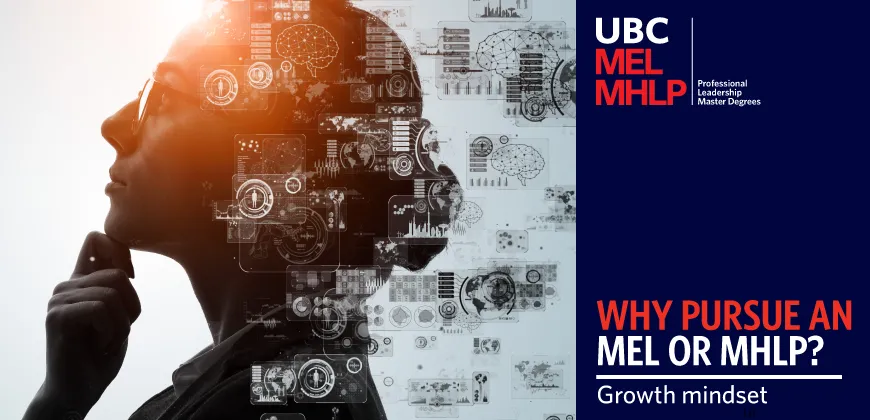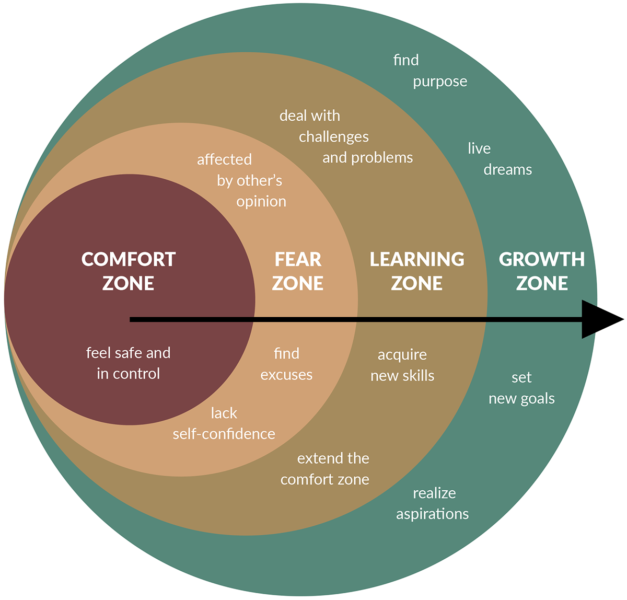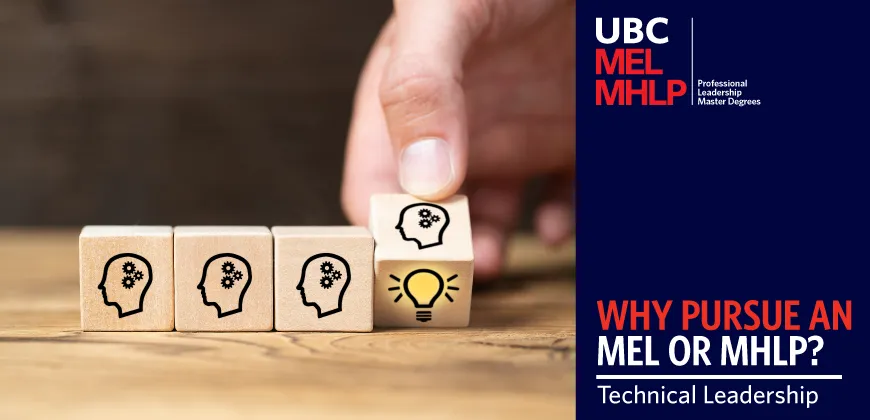Cultivating a growth mindset

Being in your comfort zone at work might feel just fine: you're respected for your expertise, you know what to do and you get it done. But you might also be wondering about something more about what would happen if you left your comfort zone and sought out new challenges.
Graduate programs like UBC's Master of Engineering Leadership and Master of Health Leadership and Policy are designed to support professionals who are curious about leaving their comfort zone. The hands-on curriculum equips students with the latest knowledge of their industry sector and best practices in leadership and business, while supporting students to take risks and develop a growth mindset.
As both current and past MEL and MHLP students attest, it's often a process of deep transformation that empowers them to achieve rewarding personal and professional growth.
Leaving your comfort zone
As Oliver Page writes in the article How to leave your comfort zone and enter your growth zone, it can be reassuring to stick to your comfort zone whether that has to do with your exercise routine or your work life. However, achieving a personal best in a 5K race or moving into a leadership position only happens when we push ourselves beyond those points where we feel safe and in control. Simply put, if you are interested in taking on new professional challenges, it's inevitable that you are going to need to move beyond what is comfortable and familiar. It might feel scary. It might require taking a leave of absence or quitting your job entirely, and could involve moving across the country or world to a place where you don't know anyone. You are likely unsure of what your future might look like after your graduate whether you will get a well-paying job in a position that challenges and excites you. You might wonder if you have what it takes to go back to school and do a masters degree after multiple years working in your profession.
As Michael Hyatt writes in Three truths for when your goals feel uncomfortable, these feelings of discomfort are normal, necessary and good. But, he argues, the more you push yourself out of your comfort zone, the easier it is to lean into the tension and set the stage for the changes or breakthroughs you are seeking.
Moving into the growth zone
Page outlines seven strategies for leaving your comfort zone, one of which is expanding your professional skillset. Investing in [new skills] can build resilience, personal satisfaction, and open up more opportunities than ever, he says. Investing in your professional skill and knowledge development puts you into a zone of learning, where you are gaining new skills and knowledge, broadening your limits and equipping yourself to deal with more complex challenges.
Going back to school to pursue a graduate degree is one way to push yourself beyond the familiar and start on a path of transformative change.
Garry Singh, for example, worked as a care aide at a long-term care home after immigrating to Canada. While he loved his job, he wondered what he could achieve if he pushed himself to expand his skill set. He says that the MHLP in Seniors Care deepened his understanding of both the contexts of seniors care and the leadership traits needed to guide organizations to provide high-quality patient-centred care. He's now working as a manager at Community Living BC, where he leads teams, manages programs and budgets, and makes sure the diverse mental health and physical needs of residents are met.
When I applied to the program, the tagline was that one year can change your life, he says. That was definitely true for me. Going to UBC and doing the MHLP in Seniors Care changed my life. It helped me build my skills and knowledge to be a more competent leader within the health-care field.
 Jason Koepke was also working at a job he enjoyed, yet he recognized that learning more about water treatment and systems, as well as business and management, would help him move into new roles and responsibilities. He completed the MEL in Integrated Water Management in 2020 and is now working at the City of Vancouver. I gained so many practical skills on the business side that are enabling me to better manage myself and my projects, he says. For example, I know more about accounting and have more confidence developing and managing budgets. What I've learned about project management and operational logistics influenced the way I organized a team of subcontractors. Even something like all the practice you get writing succinct and to-the-point memos has been very useful in daily business communications.
Jason Koepke was also working at a job he enjoyed, yet he recognized that learning more about water treatment and systems, as well as business and management, would help him move into new roles and responsibilities. He completed the MEL in Integrated Water Management in 2020 and is now working at the City of Vancouver. I gained so many practical skills on the business side that are enabling me to better manage myself and my projects, he says. For example, I know more about accounting and have more confidence developing and managing budgets. What I've learned about project management and operational logistics influenced the way I organized a team of subcontractors. Even something like all the practice you get writing succinct and to-the-point memos has been very useful in daily business communications.
Finding a new purpose
Author Oliver Page sees enormous value in looking beyond what's comfortable: "It's crucial to cultivate a mindset that lays strong foundations, paving the way toward the growth zone" he writes.
This includes seeing yourself as inherently adaptable, reframing stress, and believing in your ability to endure fears and doubts. Every person faces this choice, knowingly or not. You can settle for what you know the seemingly safe, familiar, and routine. Or, you can become receptive to opportunities for growth, challenging your personal status quo and seeing what you're capable of.
MEL and MHLP graduates show us what can be achieved when you challenge your status quo.
As instructor Michel Labrie in the High Performance Building says of the graduate programs: The result is the potential for powerful transformation and career advancement, enabling our graduates to make new connections and work for lasting change as they pivot into new areas of practice and enter new fields of specialization.


